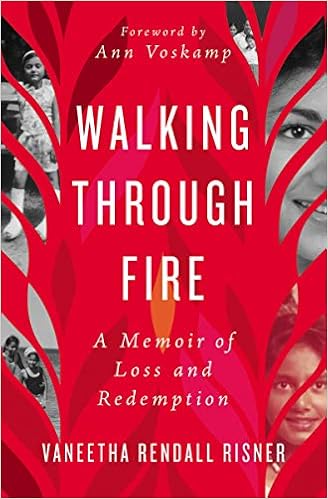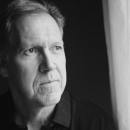After being misdiagnosed with Polio as an infant, Vaneetha Risner lived with widespread paralysis and fear she would be treated differently her entire life. She lived in and out of the hospital for ten years and after each stay, she would return to a life filled with bullying. It wasn't until she became a Christian when things got easier. In her new memoir, Walking Through Fire: A Memoir of Loss and Redemption (Buy HERE) Vaneetha shares how her journey of loss, suffering and anger became filled with incomprehensible peace and joy.
Vaneetha experienced carefree college days, a dream job in Boston and an MBA from Stanford where she met and married a fellow classmate, but it wasn't long before her life began to unravel again. She experienced four miscarriages. Her son died because of a doctor's mistake. She was diagnosed with post-polio syndrome, meaning she would likely become a quadriplegic. And then her husband betrayed her and moved out, leaving her to raise two adolescent daughters alone.
Although this wasn't the abundant life Vaneetha thought God had promised her, she discovered everything she experienced was designed to draw her closer to Christ and learned "that intimacy with God in suffering can be breathtakingly beautiful."
Q: Vaneetha, thanks for doing this interview with us. Congratulations on the release of your new memoir, tell us what inspired you to share your story through this book?
I wrote this book because I love stories. They reach a different part of us and cement truth in ways that pure doctrine and theology cannot. When I was suffering, I doubted, struggled, and made countless mistakes and yet God met me in incredible ways through it all. And I want people to see that what God gives us in suffering is more than he ever takes away because God gives us himself. I want them to believe that God's word is true and that his promises hold even when our nightmares come true.
God met me and changed me in breathtaking ways through the pain in my life and I am hoping through this memoir others will experience that also.
The Message paraphrase of 1 John 1:2-4 explains it well: "The infinite life of God himself took shape before us. We saw it, we heard it, and now we are telling you so that you can experience it along with us, this experience of communion with the Father and his son Jesus Christ. Our motive for writing is simply this: we want you to enjoy this, too. Your joy will double our joy."
Q: You have had a challenging childhood of sickness and bullying -- tell us briefly about some of sufferings you went through.
I had polio as an infant but was misdiagnosed which allowed the polio to spread quickly through my body leaving me completely paralyzed. I had 21 surgeries before age 13, and lived in the hospital for years - once flat on my back in a body cast for nine months straight. When I was home, I was bullied by schoolmates who would imitate the way that I walked and ask me what was wrong with me. When I was seven, a group of boys threw stones at me, called me a cripple and knocked me down. It altered my view of myself, and I started to believe that something really was wrong with me.
Q: What advice can you give parents to recognize if their child is being bullied?
Make sure your child knows that it's not their fault. Reinforce that bullying is a reflection of the bully, not the person being bullied. Ask your kids how they are being treated by others and how they feel about school - and share your own struggles related to bullying if there are any. They'll be more likely to open up if they feel they won't be judged or embarrassed. Give them space to talk. Listen but don't overreact. Depending on the situation, it may be necessary to get others involved
Q: You share in the book that you are a recovering people-pleaser, and so many of us can relate to that. What was the catalyst for you to change and how would you encourage listeners who are struggling with that themselves?
As far back as I can remember, I wanted people to like me and often made choices based on what others thought. The catalyst for change was being in a situation where I couldn't possibly please everyone and felt constantly judged. I was separated from my husband, trying to run my household as a single parent, struggling with where to draw boundaries. Everyone had a strong opinion on what I should or shouldn't do. I learned to ask the Lord and listen to his guidance rather than being guided by popular opinion. I had to believe that I counted too, and that what other people thought of me wasn't as important as whether my life and my choices were honoring to God.
Q: One of the most painful parts of your story is your son's death because of a doctor's mistake. Tell us about that. You said at first you felt strong but later fell apart. How did you get through such a painful experience?
My son was born with a heart problem and had surgery at birth. At two months old, a doctor erroneously took him off his medicine and he died two days later. I talked about God's faithfulness at his funeral but soon afterwards felt disillusioned, disappointed and distant from God. But I finally cried out to the Lord in desperation and he met me in an incredible, unforgettable way that honestly changed my life and my faith. Natalie Grant's song Held was written by my friend Christa Wells, and the first verse was written about my son Paul. The chorus tells about how God holds us in our suffering which is how I made it through- leaning into God and letting him hold me in my pain.
Q: Despite all the sufferings you went through, what or who was your source of hope?
Knowing God was WITH me - walking with me, talking to me, sometimes carrying me - have given me hope in my suffering. I also had to believe God was FOR me, and that my suffering was not meaningless but did have a purpose.
Q: One of the key themes of the book is forgiveness - how does that aid in healing? What advice do you have for someone struggling to forgive someone?
I don't think we can heal from the deep wounds in our lives without forgiveness. Pouring bitterness and unforgiveness into our wounds makes them fester and blocks healing, making the hurt more painful. Forgiving others keeps the wound clean.
Understanding what forgiveness is, and what it is not, can be critical. Forgiving someone is giving up my right to hurt them because they have hurt me. It is refusing to hold bitterness against people for the ways they have wounded us. Forgiveness is unconditional but it is quite different from reconciliation or restoration. Those require repentance as well as a willingness by both parties to work on the relationship.
For me, the first step of forgiveness always feels like death. But when I ask God to help me forgive in his strength, my attitude changes. I change. It's so worth it. Forgiving people who've hurt me has been the most life-changing, life-giving thing I've ever done. It's freed me, restored me and strengthened my walk with the Lord in indescribable ways. It's a decision you will never regret.
Q: How do you think your book can speak to the lives of our readers?
I'm praying that my book will show readers what it's like to meet God in suffering. I am hoping that they will turn to God, and not away, when trials come because his comfort, his love and his presence changes everything. I want readers who are in the middle of their story, as all of us are, to trust that God is writing a good story with their lives. I want them to believe that the Lord is WITH them and FOR them and is using their suffering for something much bigger than they can see or understand right now.



















